Emmanuel Todd: interviews
Emmanuel Todd: three interviews

Emmanuel Todd: on Europe and Germany (October 2014)

Interview of Emmanuel Todd by Olivier Berruyer, for the French website: les crises.fr http://www.les-crises.fr/todd-1-la-servitude-volontaire-de-la-france/ (5 installments)
translated by Anne-Marie de Grazia
Olivier Berruyer: Mr.Todd, how do you see the present crisis with Russia ?
Emmanuel Todd: There’s something strange, unreal in the present international system. Something isn’t right: the whole world is lashing out on Russia, a country of only 145 million inhabitants, which has sprung back, it’s true, but which nobody can imagine will become again a dominant power on the planetary, or even the European scale. The strength of Russia is basically defensive. Maintaining the integrity of its immense territory with such a small population, comparable to the size of Japan’s, is already problematic.
Russia is a balancing power: its nuclear arsenal and its energetic autonomy allow it to play as a counterweight to the United States. It can afford to welcome Snowden and, paradoxically, contribute in this way to the defence of civil liberties in the West. But the hypothesis of Russia devouring Europe and the world is absurd.
At the beginning of your career, you were much interested in Russia – even predicting its impending break-up. Nowadays, Russia has no longer the hegemonic level which the USSR once had, and despite the fact that Russia is much more democratic than was the USSR, it is treated much worse. For instance, when the USSR intervened in Czechoslovakia in 1968, sending in tanks, there were protests but in the end, the hysteria didn’t go on for weeks. Whereas today, where nothing of the sort is happening, besides a population democratically voting in Crimea to return to the Russian homeland, we have the impression that we are spectators to some enormous tragedy which would almost warrant going to war in order to forcibly give back Crimea to Ukraine, despite the opposite wish of its inhabitants. Why such a difference in treatment?
This question doesn’t concern Russia, it concerns the West. The West, which I grant you is massively dominant, is nevertheless at present, in all its components, worried, anxious, sick: the financial crisis, a stagnation or decrease in incomes, a hike in inequalities, a total absence of perspectives and, in the case of continental Europe, a demographic crisis. If you put yourself on the ideological plane, this fixation on Russia appears above all to be the search for a scapegoat, or better, the creation of an enemy, necessary to maintain a minimal coherence of the West. The European Union was created against the USSR; it cannot do without Russia as an adversary.
It is true that Russia confronts the Western world with some problems of « values, » but contrarily to what is suggested by the anti-Putin and russophobic stupidities of a newspaper such as Le Monde, the West’s problem lies in the positive and useful character of some of the Russian values.
Russia is a country which has not followed the Western world along the path of « total liberalism.” A certain role of the state has reaffirmed itself there, as well as certain idea of the nation. It’s a country which is starting to recover, including in terms of fecundity, and of a decrease in infant mortality. Its unemployment rate is low.
Of course, the Russians are poor and nobody in Western Europe can envy the Russian system, including at the level of liberties. But to be Russian today means belonging to a strong and reassuring national community, a possibility to project oneself mentally into a better future, it means: to be going somewhere. Who could say the same about France? Russia is about to become again, in spite of itself, the symbol of something positive which reaches beyond it. In this sense, yes, it is a real threat for those people who, in the West, pretend to govern us, grabbling around in history, who talk about the values of the West but who, according, I believe, to Basile de Koch, really know well only the values of the stock-market.
But it is already no longer a traditional conflict between East and West, regressive in a psychiatric sense, of which America would be the engine. The recent crisis stems entirely from the European intervention in Ukraine.
If one gets away from the delirium of the « Western » media, who seem to have gone back to 1956, to the middle of a Cold War threatening to heat up, and if one observes the geographic reality of the phenomena, it appears quite simply that this conflict is taking place in the traditional zone of confrontation between Germany and Russia. Very early, I have had the feeling that this time around, the United States, fearing to lose face after the return of Crimea to Russia, have followed in the footsteps of Europe, or rather, of Germany, as it is now Germany which controls Europe.
We register contradictory signals coming from Germany. Sometimes, we feel it to be almost pacifist, on a line of retreat, of cooperation. Sometimes, in the contrary, it seems very far ahead in the contestation of, or the confrontation with Russia. This hard line gains in strength every day. Steinmayer took along Fabius and Sikorski when he went to Kiev. Now, Merkel visits the new Ukrainian protectorate all by herself.
But it is not only in the confrontation with Russia that Germany is at the forefront. Within six months, including during these past weeks, when it found itself already in a virtual conflict with Russia in the Ukrainian plains, Merkel humiliated the British by forcing onto them, with unbelievable rudeness, Juncker as President of the (European) Commission. Even more extraordinary, the Germans have begun to confront the Americans, using some story of being spied on by the United States. It’s absolutely unbelievable, when one knows how much imbricated the American and German intelligence activities since the Cold War have been. It appears today that the BND, the German intelligence service, is also spying, as a matter of course, on American politicians. At the risk of shocking you, I would say that, given the ambiguities of German policies in the East, I am quite favourable to the CIA monitoring the German politicians in charge. And I hope moreover that the French intelligence services are doing their job and participate in the surveillance of a Germany that is becoming more and more active and adventurous on the international level. To which one must add that this anti-American aggressiveness of Germany is a new phenomenon which one must take into account. In its style, it’s fascinating. The way German politicians have talked about the Americans shows a deep contempt. There is an important anti-American background there. I was able to measure it when my book After the Empire came out in German. According to me, it explains largely the success in sales of this translation.
It has been a while already that the German government has been laughing at American remonstrance in matters of economic management. What, we? Contribute to the balance in world demand? What next? Germany has a project, of power more than of well-being: to compress demand in Germany, to enslave the debt-ridden countries of the South, to put to work the Eastern Europeans, to throw some peanuts to the French banking system, which controls the Elysée Palace and the Presidency, etc.
At first, at the time of the taking of Crimea, I have been rather sympathetic to Russia’s recovery: here’s a power who no longer lets itself be stepped on its toes and who is capable of making decisions. At present, I observe that Russia is fundamentally a nation in a state of stabilization, and only that, even if people represent it as the big bad wolf.
The true emerging power, before Russia, is Germany. It has gone a prodigious way, from its economic difficulties at the time of reunification to its economic recovery, to taking the continent under its control over the past five years. All this deserves to be reinterpreted. The financial crisis has not only demonstrated the solidity of Germany. It has also revealed its capacity to bring the whole continent into line. If we free ourselves from the archaic rhetoric of the Cold War, if we stop shaking the ideological rattle of liberal democracy and of its values, if we stop listening to the europeist blah-blah, and have a look at the historical sequence playing itself out under our eyes in a brute and almost childish way, in brief, if we accept to see that the king is naked, we observe that:
1) in the course of the past five years, Germany has taken control of the European continent on the economic and on the political plane ;
2) and that, at the end of these five years, Europe is already virtually at war with Russia.
This simple phenomenon is obscured by a double denial: two countries are acting as bolts, so that one cannot understand what is taking place in reality.
First, France, who does not want to admit that it has put itself in a state of voluntary servitude in relation to Germany. It cannot act in any other way as long as it does not admit fully the growth in power of Germany and the fact that it is not at a level to control it. If there is one geopolitical lesson from WWII, it is that France cannot control Germany, whose immense qualities of organization and economic discipline we must recognize, as well as its just as immense potential for political irrationality.
The French denial of German reality is an evidence. I have been talking for a while of François Hollande as “Vice-Chancellor Hollande.” Or even, now, rather as a plain “communications director of the Chancellorship.” He is nothing. He has reached exceptional levels of unpopularity which stem, in part, from his servility towards Germany. François Hollande is despised by the French because, among other things, he is also the man who obeys Germany.
On a broader plane, the French elites, journalistic as well as political, participate in this process of denial.
You say: « In the end, France cannot control Germany: » can nothing be done about it, or is it someone else’s job to do it?
It’s someone else’s job. The last time, the task fell to the Americans and to the Russians. We must admit that the “German system” is capable of generating a prodigious energy. As a historian and an anthropologist, I would say the same thing of Japan, of Sweden, or of the Jewish, Basque and Catalan cultures. It’s a fact: some cultures are like that. France has other qualities.
It has produced the ideas of equality, liberty, an art of living which fascinates the rest of the planet, it makes more children than its neighbours, while remaining an intellectually and technologically advanced country. It is probable that, in the final run, if one really had to make a judgement, one would have to admit that France has a more balanced and satisfying vision of life. But we are not talking metaphysics and morality here: but of international power ratios. If a country specializes in industry or in war, one must take this into account and see how this economic, technological and power specialization can be controlled.
Which is the second country which is in a state of denial?
The United States. The American denial has been formalized at the first stage of the emancipation of Germany, at the time of the war in Iraq in 2003 and of the association Schröder-Chirac-Putin; some American strategists said then: « Punish France, forget Germany, forgive Russia ». Why? Because the key to the control of Europe by the United States, which is the inheritance of the victory of 1945, is the control of Germany. To recognize the German emancipation in 2003 would have been to recognize the beginning of the dissolution of the American imperium. This ostrich’s strategy has settled in, become calcified, and seems at present to prevent the Americans from having a correct vision of the emergence of Germany, a new threat for them, much more dangerous in due time, according to me, to the integrity of the American Empire, than is Russia, who is external to the Empire.
Germany is playing a complex, ambivalent, but driving role in the crisis: often, the German nation appears as pacifist whereas Europe, under German control, appears aggressive. Or the reverse. Germany is now wearing two caps: Europe is Germany and Germany is Europe. Therefore it can talk in different voices. When one knows the psychological instability which historically characterizes German foreign policies, and its bipolarity in the psychiatric sense, in its relationship with Russia, it is rather worrisome. I realize that I am talking harshly, but Europe is at the brink of war with Russia and we have no longer the time to be courteous and smooth. Populations of Russian language, culture and identity are being attacked in Eastern Ukraine with the approval, the support and possibly already the weapons of the European Union. I think that the Russians know that they are in fact at war with Germany. Their silence about this point is not, as in the French and the American case, a refusal to see reality. It’s good diplomacy. They need time. Their self-control, their professionalism, as Putin or Lavrov would say, compel admiration.
Up until now, in this crisis, the strategy of the Americans has been to run behind the Germans, so that one wouldn’t see that they are no longer in control of the European situation. This America which is no longer in control, but must give its approval to the regional adventures of its vassals, has become a problem, the geopolitical problem Number One. In Iraq, America must already cooperate with Iran, its strategic enemy, in order to face the Jihadists sponsored by Saudi Arabia. Saudi-Arabia has, just like Germany, the status of a major ally. Its treason must therefore not be acknowledged… In Asia, the South Koreans, out of resentment against the Japanese, are beginning to cook up things with the Chinese, the strategic rivals of the Americans. Everywhere, not only in Europe, the American system is showing cracks, is crumbling, or worse.
German might and hegemony in Europe are therefore well worth an analysis, in a dynamic perspective. We must explore, project, foresee in order to orient ourselves in the world which is being born. We must accept to see this world as the realistic strategic school is seeing it, the one of Henry Kissinger, for example, that is, without asking oneself about political values: just plain ratios of force between national systems. If one thinks along these lines, one sees that Russia is not the problem of the future, that China does not amount to much yet in terms of a military power. In our globalized economic world, we can foresee the emergence of a new face-to-face between two great systems: the American continent-nation, and this new German empire, a political-economic empire which people continue to call “Europe” out of habit. It is interesting to evaluate the ratio of potential power between the two.
We don’t know how the Ukrainian crisis will finish. But we must make an effort to project ourselves beyond this crisis. The most interesting thing is to try to imagine what would be the result of a victory of the “West.” And we arrive at something surprising: if Russia caved in, or even only yielded, the disproportion in the demographic and industrial forces between the German system, expanded to comprise Ukraine, and the United States would probably lead to a shift of the centre of gravity of the West and to a collapse of the American system. What the Americans should most fear, today, is Russia caving in. But one of the characteristics of the situation is that the actors are incompetent or are very little aware of what they are doing. I am not only talking about Obama, who understands nothing about Europe. He was born in Hawaii, lived in Indonesia: only the Pacific zone exists for him.
But the classical American geo-politicians, of the « European » tradition, are also left behind. I am particularly thinking of Zbigniew Brzezinski, now an old man, but who remains the theoretician of the control of Eurasia by the United States. Obsessed by Russia, he hasn’t seen Germany coming. He has not seen that the American military might, by extending NATO all the way to the Baltic States, to Poland and to the other former Popular Democracies, was in fact cutting out an empire for Germany, at first economic, but at present already political. Germany is beginning to get on with China, the other great world exporter. Does anyone remember in Washington that Germany in the 1930s had long hesitated between an alliance with China and an alliance with Japan, and that Hitler had started to arm Chiang Kaï-shek and to train his army? The extension of NATO to the East could in the end bring about a version B of Brzezinski’s nightmare: a reunification of Eurasia independently of the United States. Faithful to his Polish origins, he feared a Eurasia under Russian control. He is now running the risk to go down in History as another one of these absurd Poles who, out of hatred of Russia, have insured the greatness of Germany.
As you have asked me to do, I propose to analyze the following charts, comparing the United States with a Germano-centric Europe:
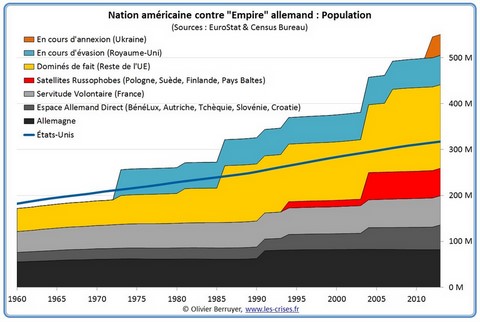
American nation against German « Empire : » Population
(Source: EuroStat & Census Bureau)
In process of annexation (Ukraine)
In process of evasion (United Kingdom) [note: he said this in 2014!]
Dominated de facto (rest of the EU)
Russophobic satellites (Poland, Sweden, Finland, Baltic countries)
Voluntary Servitude (France)
Direct German Space (Benelux, Austria, Czechia, Slovenia, Croatia)
Germany
United States
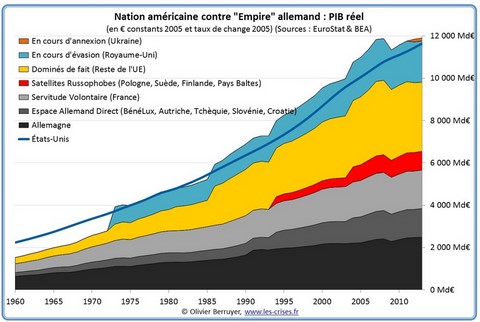
Americain nation against German « Empire : » real GDP
(in constant € of 2005 at exchange rate of 2005) (Sources: Eurostat & BEA)
In process of annexation (Ukraine)
In process of evasion (United Kingdom)
Dominated de facto (rest of the EU)
Russophobic satellites (Poland, Sweden, Finland, Baltic countries)
Voluntary Servitude (France)
Direct German Space (Benelux, Austria, Czechia, Slovenia, Croatia)
Germany
United States
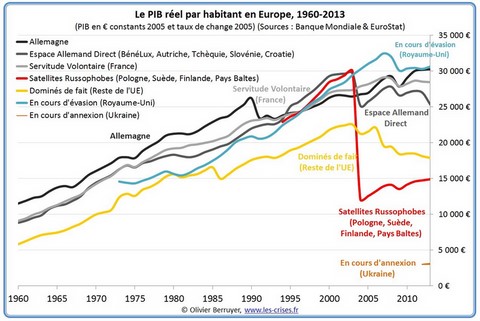
Real GDP by inhabitant in Europe, 1960-2013
(GDP in constant € of 2005 and exchange rate of 2005) (Sources: World Bank & EuroStat)
Germany
Direct German Space (Benelux, Austria, Czechia, Slovenia, Croatia)
Voluntary Servitude (France)
Russophobic satellites (Poland, Sweden, Finland, Baltic countries)
Dominated de facto (rest of the EU)
In process of evasion (United Kingdom)
In process of annexation (Ukraine)
What these graphs are showing, is the potential industrial superiority of Europe. Granted, Germany is heterogeneous and intrinsically fragile, potentially unstable, but the mechanism of hierarchizing now taking place is beginning to define a structure of domination that is both coherent and efficient. The recent German power built itself up by putting to capitalist work populations which were formerly communist. This may be a thing of which the Germans themselves are not enough aware of, and maybe that this could be their true fragility: the dynamic of the German economy is not only German. Part of the success of our German neighbours stems from the fact that the Communists were much interested in education. They left behind them, not only obsolete industrial systems, but also populations that were remarkably well educated.
Comparing the situation of education in Poland within Europe before the war with the one today, which is much better, comes down to admitting that it owes part of its good educational status to communism, even worse, maybe, to Russia. We’ll see in which state German management will leave Poland. But it must be acknowledged that Germany has substituted itself to Russia as the controlling power in Eastern Europe and that it has succeeded in turning this into a strength. Russia, by contrast, had been weakened by its control over the democratic republics, as the military cost was not compensated for by economic gain. Thanks to the United States, the cost of military control is, for Germany, close to zero.
This map shows the new German empire such as it is according to you. We see the central place of Germany facing its various satellites, or those, as you say so well, in a state of voluntary servitude. What does this map mean for you?
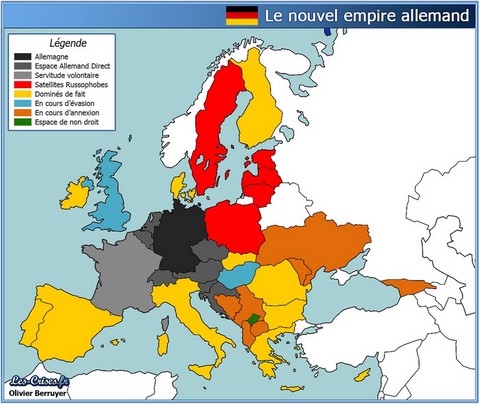
The new German Empire
Germany
Direct German Space
Voluntary Servitude
Russophobic satellites
Dominated de facto
In process of evasion
In process of annexation
Zone of lawlessness
I would like it to help us become conscious of the fact that Europe has changed in nature and also that it evoke for us not only the present but also a very near future. The maps which are generally provided by the European Community are maps which pretend to be egalitarian and which no longer speak about reality. Here we have something like a first attempt at a visual organization of the new reality of Europe. It helps one to become aware of the central character of Germany and of the way it holds the European continent in its grip. The first thing that this map is trying to say is that there exists an informal space that is larger than Germany itself, « the direct German space, » and which contains countries whose economies are in a quasi-absolute level of dependency towards Germany.
Maybe that some will see « errors » here, like, for instance, the integration of Switzerland, which doesn’t even belong to the European institutions. But whatever the feelings of the Swiss may be, the objective truth is that, as soon as one has to do with important Swiss companies, one can feel the German presence. The level of interpenetration at the economic level is such that one cannot talk of an independence of Switzerland.
As for the Netherlands, just as Friedrich List had predicted, they have become the mere outlet of Germany on the Rhine. Czechoslovakia sealed its fate the day it decided to sell Skoda to Volkswagen. Thanks to this very populated central space, Germany has an influence which is far greater than the one of its 82 million inhabitants.
The one of a zone of about 130 million inhabitants…
Indeed. But this space is not the unique reason of German influence. I think that Germany would never have been able to take control of the continent without the cooperation of France. This is another element presented on this map: the voluntary servitude of France and of its economic system and, within this framework, the acceptance by the French elite of what may be for them – but not for the French people – the golden cage of the Euro. The French banks are more or less surviving inside this golden cage. France adds up its 65 million inhabitants to the immediate German space and in this way, it confers upon it some sort of a critical mass at the continental scale.
Nearly 200 million…
Which means that we are already beyond the scale of Russia or Japan. This black and grey block represents the heart of German might; it maintains in a state of submission Southern Europe, which has become a dominated zone within the European system itself. Germany is detested in Italy, in Greece, and probably in all of Southern Europe, because of its iron hand in budgetary matters. But these countries can do nothing about it, because Germany, with its near space to which is added France, has the capacity to dominate everything. These countries are represented in orange on the map.
I am proposing another specific category of countries, in red, which I have called the « russophobic satellites. » Paradoxically, these countries have a certain degree of liberty. They are in the German space of sovereignty, but I would not qualify their status as one of servitude, because they have true aspirations to autonomy and especially an anti-Russian passion. Look at France: it no longer has a dream; under the direction of the Socialist Party and of the UMP and its inspectors of finances, it aspires only to obey, to imitate and to cash in its director’s chips. Poland, Sweden, the Baltic countries, they have a dream: they want to get the skin of Russia. Their voluntary participation in the space of German domination allows them to believe in it. But I am asking myself if, at a deeper level, Sweden is not about to become entirely as it was before 1914, namely germanophile.
The russophobic satellites deserve a special category because they belong to the forces which could help Germany take a wrong turn. As for the French elites, they have already helped Germany to go down the wrong path by divinising it and by refusing to criticize it. French submissiveness will appear to future historians as a fundamental contribution to the coming mental imbalance of Germany. For Sweden or Poland or the Baltic countries, it’s another thing again. There, what they want, is to push Germany frankly and directly to violence in international relations.
I did not place Finland and Denmark in this category. Contrarily to Sweden, Denmark is authentically liberal by temperament. Its links with England go beyond the mere, typically Scandinavian, bilinguism of a large part of the population. It looks towards the West and is not obsessed by Russia. As for Finland, it had learned to live with the Soviets and it doesn’t have any good real reason to doubt that it can get along with the Russians. True, it has been at war with them. It has belonged to the empire of the tsars from 1809 to 1917, but in the form of a Grand-Duchy, a situation which has, in fact, permitted it to escape the yoke of Sweden. The true colonial power, for the Finns, is Sweden, and I doubt that they would really like to return under Swedish leadership. On the map, Finland and Denmark appear therefore as dominated, like the countries of the South. Is this absurd? The Finnish economy is already paying the price of European aggression against Russia. And Denmark will get into difficulty through the escape of England.
The United Kingdom I have described as being « in a process of evasion, » because the English cannot adhere to a continental system which they have in horror. Because they do not, like some Frenchmen, have the habit to obey the Germans. But also because they belong to another world, one much more exciting, less old and authoritarian than German Europe, the « Anglosphere: » America, Canada, the former colonies… I have had the occasion to say that I am sympathising with their dilemma, how horrible it must feel to be British, facing a Europe that is so important in commercial exchanges, and so mentally arthritic.
Do you think that they will someday quit the European Union?
Of course! The English are neither stronger nor better, but they have the United States behind them. Already as far as I am concerned, I, a little Frenchman, confronted with the disappearance of my nation’s autonomy, if I have to make a choice between German hegemony and American hegemony, I’ll chose American hegemony without hesitating. Then, what do you think the English are going to choose?
I have associated the Hungarians to the British in the attempt at evasion. Viktor Orban has got himself a bad reputation in Europe. Allegedly because he is an authoritarian and belongs to the hard right. Maybe. But more than anything, because he is resisting German pressure. One might ask why Hungary is not anti-Russian, despite the violent Soviet repression it went through in 1956. As is often the case, “despite” should probably be replaced here by “because.” In 1956, Hungary was alone in facing up. More than the Poles or the Czechs – who didn’t budge then, or almost didn’t – Hungary can be proud of its history under Russian domination. It is in a position to be able to forgive. A cute joke of the 1970s may help understand the differences in Eastern Europe: « In 1956, the Hungarians behaved likes Poles, the Poles like Czechs and the Czechs like pigs. »
I have represented Ukraine as being “in the process of annexation.” Ukraine wouldn’t appear upfront as a dream of a Europeist annexation. It is the annexation of a zone in political and industrial decomposition, whose disintegration will be accelerated by the free-trading accords with the European Union. But it is also the annexation of an active population which is very low-cost.
And fundamentally, the new German system rests on the annexation of active populations. In a first stage, the populations of Poland, Czechia, Hungary, etc, were put to use. The Germans have reorganized their industrial system using their low-cost labour. The active population of a 45-million-inhabitants Ukraine, with its good level of training inherited from the Soviet period, would be an exceptional catch for Germany, the possibility of a Germany dominant over a very long period, and more than anything, with its empire, immediately becoming an economic power effectively above the one of the United States. Poor Brzezinski!
And as far as the energy stakes are concerned ?
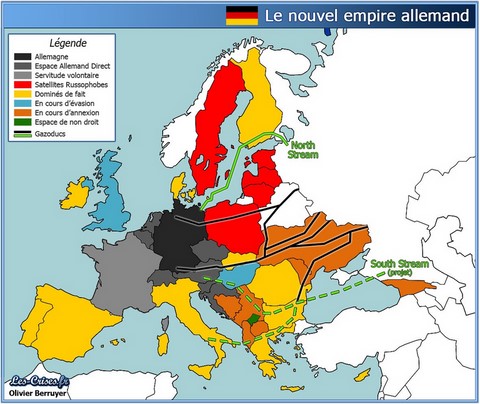
The new German Empire
Germany
Direct German Space
Voluntary Servitude
Russophobic satellites
Dominated de facto
In process of evasion
In process of annexation
Zone of lawlessness
Gas-pipelines
Here, the main gas pipelines are indicated in order to shake up a myth. The myth that by the construction of the South Stream gas pipeline, the Russians seek only to escape the control by Ukraine of their energy relations. If one looks at all the projects of gas pipelines in existence, their sole common feature is not that they are passing through Ukraine, it’s also that they all end up in Germany. In fact, the real problem of the Russians is not just Ukraine, it is also the control of the arrival of the gas pipelines by Germany. And this is also the problem of the Southern Europeans.
If we stop thinking about Europe naively as an egalitarian system which has problems with the Russian bear, we see that Germany too can have an interest in the South Stream gas pipeline not being built, because it would make escape from its control the energy supplies of the whole part of Europe which it is dominating. The strategic stakes of South Stream are therefore not just stakes between East and West, between Ukraine and Russia, but also stakes between Germany and the dominated Europe of the South.
But, again, this is not a definitive map; it’s a map the purpose of which is to create a beginning of an image of the reality of Europe and bring us out of the ideology of neutral maps which hide from us what Europe is becoming: a system of unequal nations, caught in a hierarchy which includes severely dominated countries, aggressive countries, one dominant country, as well as one country which is the shame of the continent, namely ours, France…
You do not evoke the Turkish question…
If I didn’t mention it, it’s because it’s no longer relevant. The Europeans don’t want Turkey. But what’s much more important, the Turks no longer want Europe. Who would presently want to enter this prison of peoples?
The following charts allow us to compare the relative might of the American nation and of this new German empire:
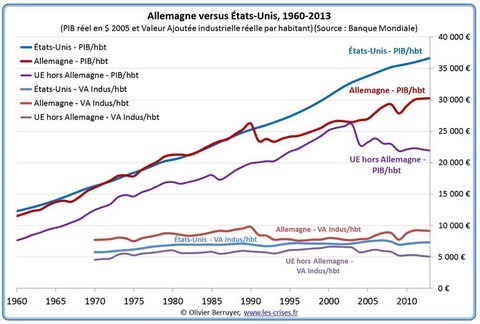
German vs United States, 1960-2013
(real GDP in £ of 2005 and real industrial Added Value by inhabitant) (Source : World Bank)
United States – GDP/inh
Germany – (GDP/inh)
EU without Germany – GDP/inh
United States – Indus AV/inh
Germany – Indus VA/inh
EU without Germany – Indus AV/inh
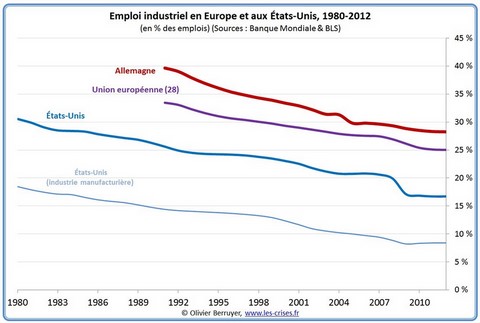
Employment in Industry in Europe and the United States, 1980-2012
(in % of employment) (Sources: World Bank & BLS)
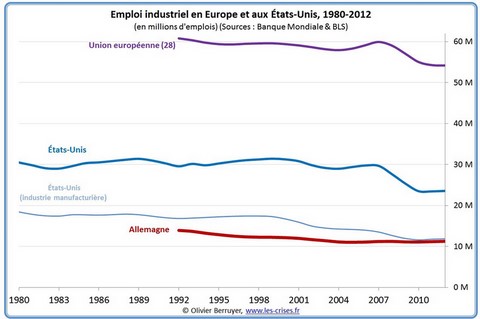
Employment in Industry in Europe and the United States, 1980-2012
(in millions of jobs) (Sources: World Bank & BLS)
The most interesting chart in my opinion is the one which represents the active industrial populations. The industrial unbalance in favour of the European Union in relation to the United States is spectacular. The fact that there exist in Europe industrial sectors which are still underdeveloped is not a negative, quite in the contrary: in the industrial domain in Europe, there exist capacities of expansion in low-salary zones. It is probably this unbalance which would make possible the killing off by Germany of the American industrial might. At the present stage, it’s Germany who most wants the Transatlantic Treaty.
One can well see the uncoupling of Europe in relation to Germany at the level of real GDP:
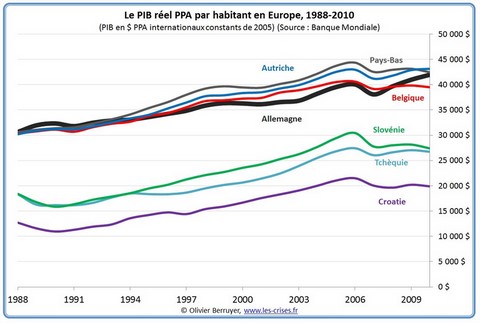
Real GDP PPP per inhabitant in Europe, 1988-2010
(GDP in $ constant international PPP of 2005) (Source: World Bank)
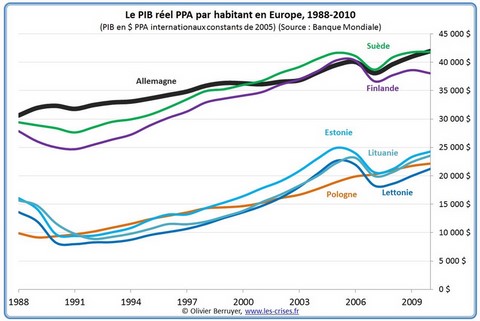
Real GDP PPP per inhabitant in Europe, 1988-2010
(GDP in $ international constant PPP of 2005) (Source: World Bank)
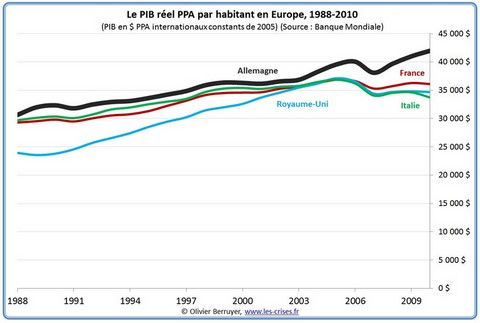
Real GDP PPP per inhabitant in Europe, 1988-2010
(GDP in $ international constant PPP of 2005) (Source: World Bank)
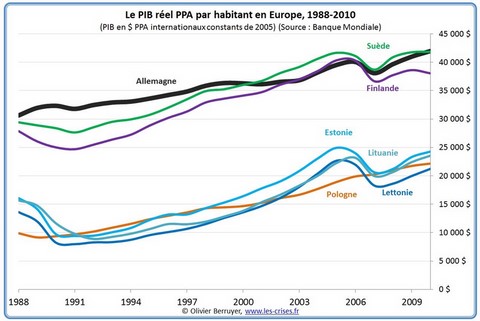
Real GDP PPP per inhabitant in Europe, 1988-2010
(GDP in $ international constant PPP of 2005) (Source: World Bank)
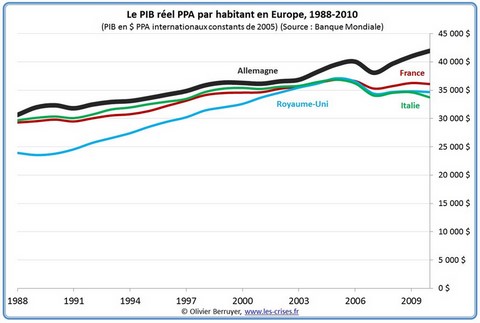
Real GDP PPP per inhabitant in Europe, 1988-2010
(GDP in $ international constant PPP of 2005) (Source: World Bank)
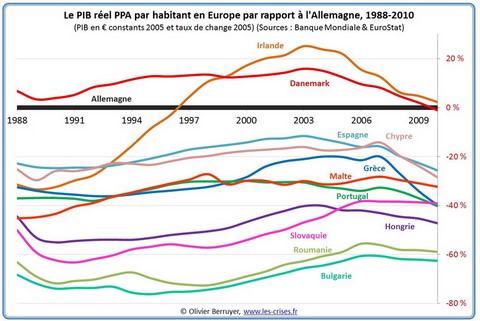
Real GDP PPP per inhabitant in relation to Germany, 1988-2010
(GDP in constant € of 2005 and exchange rate of 2005) (Sources: World Bank & EuroStat)
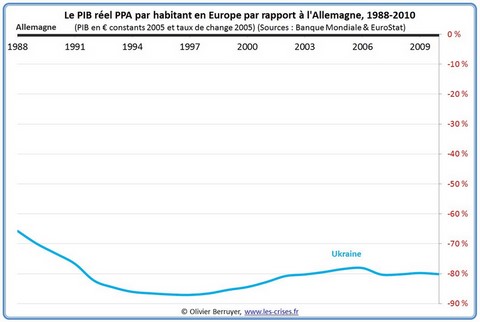
Real GDP PPP per inhabitant in relation to Germany, 1988-2010
(GDP in constant € of 2005 and exchange rate of 2005) (Sources: World Bank & EuroStat)
One can also see on these charts the unrelenting hierarchizing of Europe around the German epicentre beginning in 2005: the European countries uncoupling from Germany, including the big ones, like France and the UK.
One can see on all these curves the speed of an evolution which is only beginning. Maybe that one part of the German people is suffering from their low salaries but, globally, in the end, the GDP per inhabitant always takes off in favour of Germany. We are moving towards a system in which the Germans will be the beneficiaries of the crushing of the industrial systems of the rest of the continent.
One can also observe that, in relation to this continent under German control, the United States alone are not at a level in terms of population.
The integration of the Ukrainian population by the German system would represent a qualitative jump in this dynamic unbalance.
Granted, it is a numerous population, but it is poor and produces little…
Yes, but annexing the geographically contiguous and politically controllable poor, in a globalized world craving low-cost labour forces, can be an advantage. Our world is now post-democratic and un-egalitarian; it therefore fosters virtual expansion in zones of very low salary rates.
And Ukraine’s advantage for the new German empire is precisely that it doesn’t exist. It is double, even triple. It is a disintegrating system. In reality, Ukraine has never existed as a correctly functioning national entity. It’s a false state, and it is bankrupt. The fundamental proof of Ukrainian incapacity of statehood, and this has not been stressed, is the role played by the leaders of the Western Ukrainians, at the periphery of the country. One sometimes gets indignant over this, and starts counting their deputies, their ministers, but the Western Ukrainians, altogether, do not represent much. However, what is striking, is the inaction of the central Ukrainians, that is, those who speak Ukrainian, who do not like the Russians that much, who belong originally to the Orthodox religion but who are not tempted by the far-right. The rise in power of Western Ukraine shows at what point Central Ukraine, which is the majority, is atomised, incapable of organizing itself, in a state of pre-statehood.
The confrontation playing itself out between the Ukrainian far-right and the pro-Russians in Eastern Ukraine makes evident the historical inexistence of the country. The Western Ukrainians want to adhere to Europe. This is perfectly normal as far as they are concerned: why would extreme-right movements which have a tradition of collaborating with Nazi Germany refuse to join a Europe under German control?
All this said, this exceptional Ukrainian catch has not yet been bagged by Germany. The game, or rather the war, is only beginning.
As for the Central Ukrainians, I think that the question has been taken care of. The system will continue disintegrating : the GDP will contract, the situation will get worse, and I think that this is the real reason why the Russians are so prudent, are so little inclined to go to war and, contrarily to what is being asserted, do not want to annex bits and pieces of Ukraine. Russia is not afraid of Western sanctions. But it does not want to become hated in Central Ukraine. In its central mass, Ukraine is mistrustful of Russia at the present stage, but one must recognize to the Russians a great historical capacity to play with space and time. After two years of being handled by German Europe, what will the people of Kiev think? Maybe they will want to return to Moscow. A disintegrating system does not adhere, it continues disintegrating.
Let’s return to the global might of the American system, which is so far away from Ukraine, and therefore has very little capacity to benefit from its integration-disintegration through the « Western system. »
The American system, according to Zbigniew Brzezinski, is the control by the United States of the two great industrial regions of Eurasia, meaning, Japan and Germany. But this can function only under the condition of the hypothesis where America itself is clearly superior in terms of industrial weight.
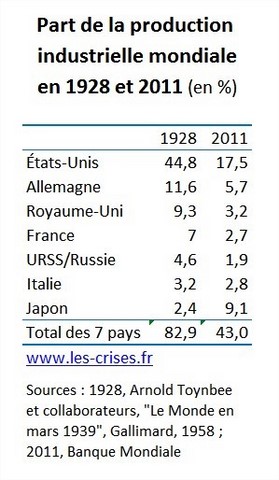
Share of world industrial production in 1928 and 2011 (in %)
United States
Germany
United Kingdom
France
USSR/Russia
Italy
Japan
Total of 7 countries
Sources: 1928, Arnold Toynbee and collaborators, “Le Monde en mars 1939,” Gallimard, 1958; 2011, World Bank.
As early as 1928, the American industrial production represented 45 % of the total world industrial output. After the war, in 1945, America still represented 45 %. America is down to 17.5 %: the Brzezinski system of a control of Eurasia cannot hold in regard of the present numbers. As I observed in After the Empire, its economic exchanges with Ukraine are insignificant. In Eastern Europe, NATO is in fact securing a German space. One should re-actualise, for the sake of Washington, the French expression “to wage war for the King of Prussia.”
In such a context, what future can there be for German-American relations?
If you live in the enchanted world of the presently dominant ideology of the newspaper Le Monde, of François Hollande, which is also the ideology of naive anti-imperialists, the Western block, a union of America and Europe, with its ward Japan, must and can contain Russia. In the hypothesis of a good strategic understanding and a strong collaboration, the West could defeat the Russian economy. Maybe… But then there is China, India, Brazil, the world is big…
But if we move into the world of strategic realism, which sees the reality of the relationships of power without a reference to real or mythic values, we see that there exist presently two great developed industrial worlds, America on the one side and this new German empire on the other. Russia is a secondary question. We must therefore foresee a completely different future for the twenty years to come than the East-West conflict: the rise in power of the German system suggests that the United States and Germany are moving in the direction of conflict. This is an intrinsic logic founded upon relations of force and domination. In my view it is unrealistic to foresee a pacific understanding for the future.
Yet at this stage, we may reintroduce the notion of value. But precisely in order to stress that, for an anthropologist, in his own way a realist, or for a historian of the long term, the United States and Germany do not share the same values. Confronted with the economic stress of the Great Depression, America, the country of liberal democracy, produced Roosevelt, whereas Germany, a country of an authoritarian and non-egalitarian culture, produced Hitler.
Granted that the belief of Americans in equality is very relative. The United States are the leading country in the rise of economic inequalities – even when putting aside segregation towards the Blacks, a problem which is far from having been solved, as can be seen from the riots in Ferguson. But it is also, at the present stage, a leading country in its attempt to create a unified world, with populations of very diverse origins. In this sense, the election of Obama remains strongly symbolic, despite the evident wear and tear shown by the President during his second term.
If one takes only into account the corpus of citizens of Germany, we can say that the rise of inequalities remains very reasonable, much inferior to what we can observe in the Anglo-American world. But if one observes the German system in its European globality, integrating the low salaries of Eastern Europe and the compressions of salaries in the South, one can identify a system of a much stronger un-egalitarian domination in a state of gestation. The equality which is left concerns only the dominant, German citizens.
At this stage, I will take up this concept of political science of the Belgian anthropologist Pierre van den Berghe : the Herrenvolk democracy, that is, the democracy of the master people. Now don’t jump to the ceiling! These words are not going to bring down the world – I have recently expressed myself in these terms in an interview with the German newspaper Die Zeit.
At the beginning, Pierre van den Berghe was applying this concept of an ethnic democracy to apartheid South Africa, where there existed a corpus of equal citizens which was functioning perfectly well according to the liberal and democratic rules, but whose liberty and democracy could only hold because there existed these dominated groups. It was the same for America at the time of segregation: the internal equality of the white group was assured by its domination over the Indians, the Blacks… One could in the same way characterize Israel as being a Herrenvolk democracy. What cohesion and liberty there is in the Israeli democracy is bolstered by the existence of an enemy mass of Arabs.
If I had to describe present day Europe, if I had to comment the economic map at the political level, I would say that Europe, or the German Empire, is beginning to take the general shape of a Herrenvolk democracy with, at its heart, a German democracy reserved for the dominating people and, around it, a whole hierarchy of populations more or less dominated, whose votes no longer have any importance. It is easier to understand, in such a model, why, when one elects a President in France, nothing happens. Because he no longer has any power: particularly not on the monetary system.
So one finds oneself in a democracy in which the liberties of the press, of opinion, and others, are perfectly respected; where there is no problem but where, fundamentally, the stability of the system rests on the subconscious solidarity inside the dominating group. In the Europe taking shape, one can see the Germans as the Whites in segregation America.
Presently, political inequality is evidently stronger in the German system than in the American system. The Greeks and others cannot vote in the elections to the Bundestag, whereas the Blacks and the Latinos can vote in presidential and congressional elections. The European Parliament is baloney, the American Congress is not.
After such an indictment, do you think that we should be more vigilant towards Germany?
It’s true that I am pessimistic. The probability that Germany will turn out right is getting lower every day. It is quite small already. The authoritarian German culture generates a systemic mental instability of the leaders when they are in a situation of domination – something that has not happened since the war. Their frequent historical incapacity – in a situation of dominance – of imagining a peaceful and reasonable future for everybody re-emerges today in the form of an export mania. To this is now added, for these leaders, the interaction with Polish absurdity and Ukrainian violence. Sadly, the fate of Germany doesn’t appear to me as a total unknown.
In what way will the Germans turn wrong? The median age or the absence of a military apparatus may put a brake to the process, but one notices every week a radicalisation in the German posture. Contempt for the English, for the Americans, shameless visit of Merkel to Kiev. The relationship to the French, the voluntary servitude of whom is essential for the control of Europe, will be revelatory.
But we know already. With the affair of the sales of the Mistral to Russia: the German leaders are now asking the French to liquidate whatever military industry they have left. The German culture is un-egalitarian: it makes difficult the acceptance of a world of equals. When they are feeling that they are the strongest, the Germans will take very badly the refusal of the weaker to obey, a refusal which they perceive as unnatural, unreasonable.
In France, it would rather be the contrary. Disobedience is a positive value. One lives with it, it’s part of the French charm because in France, too, there exists a mysterious potential for order and efficiency.
The relationship of America to discipline and inequality is complex in another way, and would deserve many pages of analysis. Let’s be brief and jump to the conclusion: a disciplined inferior-superior rapport of the German type will not pass easily. Anglo-Saxon culture is not egalitarian but it is truly liberal. Equal, unequal, it’s the same thing in the end. The reasonable difference made within families between brothers leads to the notion of a reasonable difference among individuals, among peoples. This is actually the reason for the success of the American model: the Anglo-American culture is capable of managing reasonably international differences.
In the end, we cannot but observe that both blocks – the American and the German – are antagonist by nature. They combine all the elements which generate conflict: rupture in the brute economic balance, difference in values. The faster Russia will be out of the game, either broken or marginalized, the faster these differences will come to express themselves.
For me, the real historical question at present, the one nobody is asking, is the following: will the Americans accept to see this new reality of a Germany which is threatening them, and if yes, when?
When you are prophesizing a conflict between the American nation and the new German empire, are you sure of yourself?
Of course not. I am only broadening the prospective field. I am describing one possible future among other possible futures. Another would be a solidifying of the group Russia-China-India in a continental block opposing the Western Euro-American block. But this Eurasian block can only function with the addition of Japan, who alone is capable of bringing it up to the Western technological level. But what will Japan do? For the time being, it is more loyal towards the United States than is Germany. But it might get tired of the old Western conflicts. The present shock is paralyzing its rapprochement with Russia, which should be completely logical for it from the energetic and military point of view, an important element in the new political course engaged by the Japanese Prime Minister Abe. This is another risk for the United States, deriving from the newe Prime Minsiter Abe. view ofmerican block. yourself?s.aging rea aggressive German course.
Several futures are possible, but not an infinity; 4 or 5, maybe…
I have gone back to reading science-fiction in order to deep-cleanse my brain and open my mind. I much recommend an exercise of the same type to the people who are our leaders and who are pressing ahead with such a firm step, without knowing where they are going…
End of interview
Translation: Anne-Marie de Grazia
Interview made for the site www.les-crises.fr, freely reproducible in a non-commercial context (as all the articles of the site, cf. Licence Creative Commons).

